Hong Kong protesters trap leader for hours in stadium after 'open dialogue'
I hope you all understand that we still care about Hong Kong society, says Lam
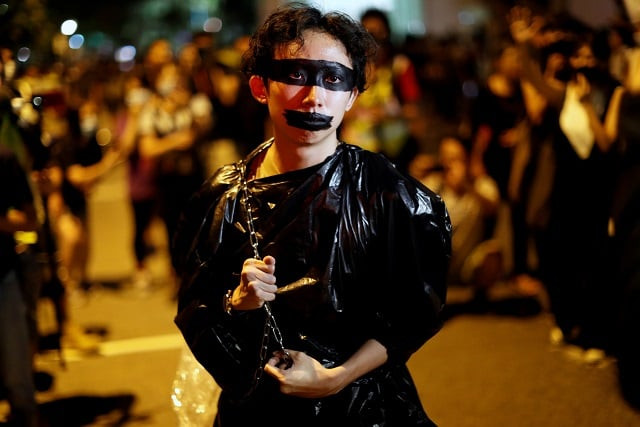
A performer carries a chain outside the venue of first community dialogue held by Hong Kong Chief Executive Carrie Lam. PHOTO: Reuters
Activists blocked roads and stood their ground despite police warnings, before beginning to disperse. More than four hours after the talks had ended, a convoy carrying Lam and other senior officials left the building under police guard.
Inside the British colonial-era Queen Elizabeth Stadium, residents had earlier chastised Lam, accusing her of ignoring the public and exacerbating a crisis that has no end in sight.
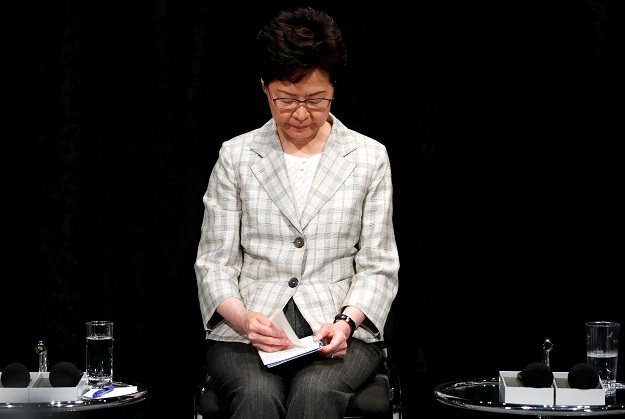 Carrie Lam attends the first community dialogue session in Hong Kong. PHOTO: Reuters
Carrie Lam attends the first community dialogue session in Hong Kong. PHOTO: ReutersShe had begun by saying her administration bore the heaviest responsibility for resolving the crisis.
“The whole storm was caused by the extradition bill initiated by the government,” Lam said. “If we want to walk away from the difficulty and find a way out, the government has to take the biggest responsibility to do so.”
Hong Kong protesters aim to 'stress test' airport
Protests over the now-shelved extradition bill that would have allowed criminal suspects to be sent to mainland China for the trial have evolved into broader calls for full democracy, in a stark challenge to China’s Communist Party leaders.
The demonstrations resumed after the dialogue session was over, with activists blocking roads around the stadium with iron railings and other debris.
The unrest followed an event that had been notable for not being the whitewash many predicted, with Lam directly facing off with an often critical and hostile audience, still aggrieved at the havoc they blame on the Beijing-backed leader and her team.
Protesters are angry about what they see as creeping Chinese interference in Hong Kong, which returned to China in 1997 under a “one country, two systems” formula intended to guarantee freedoms that are not enjoyed on the mainland.
Outside, large crowds of black-clad protesters chanted: “Hong Kong people, add oil,” a slogan meaning “keep your strength up”, while encircling the sports stadium and blocking exits.
Police warned that they would use force but did not intervene.
The event saw Lam holding talks with 150 members of the community.
China plans triumphant 70th anniversary despite headwinds
Speakers criticising her for curbing electoral freedoms, ignoring public opinion and refusing to allow an independent inquiry into allegations of police brutality. Several called on Lam to resign, saying she was no longer fit to lead.
Calm down
Lam listened, taking notes, before responding on occasion. She appealed for people to give her government a chance while emphasising Hong Kong still had a bright future and a strong rule of law.
“I hope you all understand that we still care about Hong Kong society. Our heart still exists,” she said. “We will maintain our care for this society.”
She stressed again, however, that she saw no need at the moment for an independent inquiry, with an existing police complaint mechanism sufficient to meet public concerns.
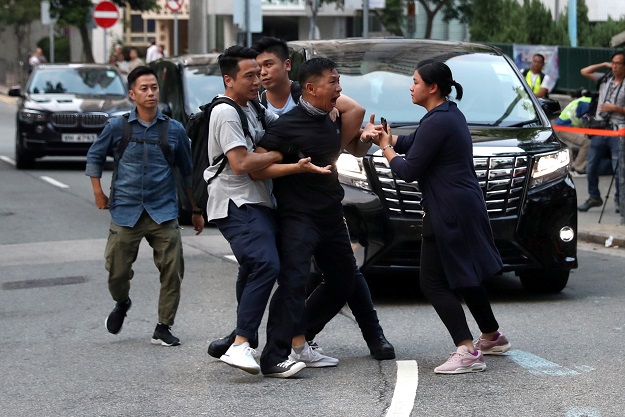 A protester is escorted by undercover police officers after he tried to stop Hong Kong Chief Executive Carrie Lam's motorcade in Hong Kong. PHOTO: Reuters
A protester is escorted by undercover police officers after he tried to stop Hong Kong Chief Executive Carrie Lam's motorcade in Hong Kong. PHOTO: ReutersShe also reiterated there was no way she could bow to the demand for charges against those arrested for rioting to be dropped.
“I am not shirking responsibility, but Hong Kong really needs to calm down,” she said. “We have to stop sudden violence breaking out... Violation of the law will result in consequences we have to bear.”
She also conceded limits to what she could do.
“There are some things that me and my colleagues cannot influence in society ... but the dialogue will continue.”
China says it is committed to the “one country, two systems” arrangement and denies meddling. It has accused foreign governments, including the United States and Britain, of inciting the unrest.

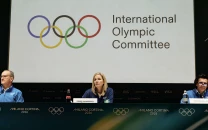
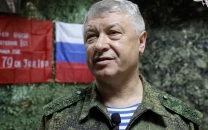
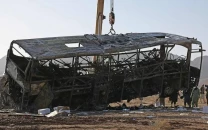
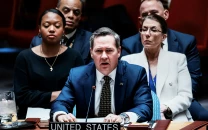
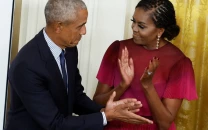
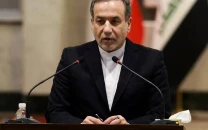












COMMENTS
Comments are moderated and generally will be posted if they are on-topic and not abusive.
For more information, please see our Comments FAQ